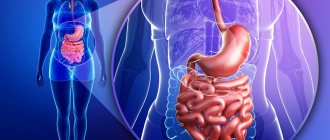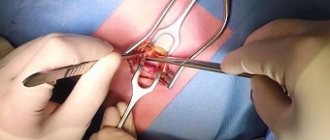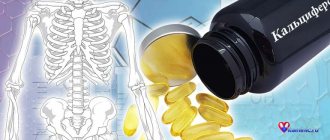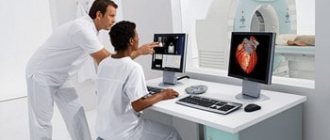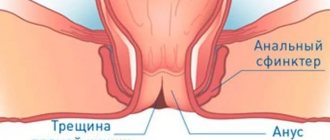In this article we will provide you with information that will help you find the answer to such an important question: “How does smoking affect the stomach?” Unfortunately, many smokers do not think at all about the problem of smoking in general, as well as about the effect of nicotine on the gastrointestinal tract. Problems such as poor digestion, increased acidity, and the risk of cancer appear in the body.
What effect does smoking have on the stomach?
When tobacco smoke is inhaled, it is swallowed along with saliva and then easily enters the stomach cavity through the esophagus. After this, nicotine is absorbed by the mucous membrane and has a strong irritant effect.
In parallel with this process, a large amount of hydrochloric acid is produced, provoked by increased saliva production. Due to the processes described above, active digestion of saliva, which contains sedimentary compounds of tobacco smoke, begins in the cavity of the gastrointestinal tract. However, its harmful components provoke thinning of the protective layer of the stomach and the development of erosion.
After a lot of research, experts were able to prove that tobacco smoke requires 8 seconds after the first puff for the nicotine components to affect the functioning of the central nervous system. The main danger of such an effect is the blocking of the hunger center, which causes the chicken’s appetite to decrease.
That is why smoking on an empty stomach poses a particular danger to the health of the gastrointestinal tract. In the absence of adequate stimuli from the center of hunger and satiety, the body cannot signal a nutritional deficiency. The stomach or intestines can hurt precisely because of the development of erosions on their surface.
Smoking and appetite
Very often, a heavy smoker appears as a thin person, prone to nervous breakdowns, who convulsively inhales cigarette smoke and releases it through his mouth and nostrils. Why he is nervous is clear to many, since cigarettes often serve as a kind of sedative for a person during times of severe stress. But here's the thing about being thin: most people seriously believe that smoking allows you not only to stay in shape, but also to lose a few kilograms. However, in reality this is a big misconception.
There is a myth among cigarette lovers that talks about suppressing hunger with the help of an addiction. What actually happens is this. When nicotine enters the body, the excitement of the nervous system decreases, or rather, it deceives. At the same time, nothing enters the smoker’s stomach. Replacing a full meal or even a small snack with a couple of cigarettes over time causes pathological processes in the gastrointestinal tract, and a person can become seriously ill. Such diseases include gastritis, gastric ulcers and other pathologies that accompany belching, abdominal pain and heartburn from smoking.
In addition, since a smoker's digestion slows down, the absorption of nutrients is impaired. As a result, a person may begin to notice signs of weight loss. But it will be accompanied by symptoms of impaired metabolism: numerous skin rashes, unhealthy complexion, dullness and faded hair. With all this, the smoker may not complain that he is somehow bothered by alarming symptoms. There is also an explanation for this. Nicotine can trigger the release of dopamine into the brain, a neurotransmitter that creates a feeling of joy and happiness in a person.
Causes of pain
Each cigarette smoked has only a negative effect on the state of the human body, so everyone could notice that their stomach hurts after smoking. There are certain links in its effect on intestinal function:
- Due to systematic smoking, the nervous and humoral regulation of the functioning of the stomach is disrupted. The inability to timely determine the body's need for food leads to disruption of the production of gastric juice. All these dysfunctions negatively affect the process of digesting food.
- The development of pain after smoking occurs due to untimely production of gastric juice. This leads to food stagnating in its cavity for a long period and leading to overstretching. Tobacco has a spasmodic effect, so after smoking, the muscle fibers of the stomach contract, intestinal motility is disrupted, and food is retained in the upper gastrointestinal tract.
- Due to spasm of blood vessels, oxygen starvation of the body is observed due to reduced blood circulation.
A person who smokes must remember that passive consumption of nicotine is more harmful, so strangers should not breathe the entire chemical periodic table!
Features of treatment
If a person decides to get rid of a bad habit without the help of a specialist, then the side reactions of such treatment may be:
- increased irritability;
- attacks of nausea;
- disruption of the digestive tract.
The cause of all these consequences is exposure to tobacco smoke and dependence on it, so quitting this addiction too suddenly is not recommended.
However, when visiting your doctor, you can learn some useful tips, which are as follows:
- In the first weeks after quitting smoking, it is better to reduce the consumption of fatty foods, carbonated drinks and foods with a significant content of salt. It is these types of dishes that negatively affect the functioning of the gastrointestinal tract by creating additional stress, which leads to aggravation of the problem.
- You need to diversify your diet mainly with the help of hot meat, fish and vegetable broths.
- Thanks to sports, you can “shake up” the work of the adrenal glands and influence the release of adrenaline, due to which the patient will have motivation and the opportunity to enjoy something other than smoking. An alternative is to take evening walks. This method will not help reduce pain, but will help normalize health.
- When quitting smoking, you need to drink more still water, various natural jellies, compotes and diluted freshly squeezed juices.
- When diarrhea develops, you need to add rice to various dishes and soups, which has a fixing effect and normalizes peristalsis.
Destroying myths
There is a fairly widespread belief that the dangerous dose of nicotine for humans is 30-60 mg. In e-liquid this would be equivalent to 5ml of 6mg/ml e-liquid. At the same time, the human body deals with nicotine quite quickly, so this volume of liquid must enter it at once. Which, you see, is hardly possible. Even if there was an electronic cigarette that could allow such an overdose, it would have to be supplemented with very powerful and voluminous lungs.
However, Bernd Mayer, a scientist from Graz, decided to find the source of this information. In his research, he found that this myth originated during a dubious experiment in the mid-19th century. This experiment was referred to by Rudolf Kobert, a toxicologist with a good reputation, whom simply no one bothered to refute.
According to Mayer's calculations, published in the Archives of Toxicology, the lethal dose of nicotine for humans is 500-1000 mg. In addition, he also cites as an argument the fact that the blood of people who died from nicotine contained about 20 times more of the substance.
Why does my belly grow?
Still, when you quit smoking, the overall benefits far outweigh the problems with weight gain, which can be corrected with some effort. Compared to smoking, being overweight doesn't have as high a mortality risk, so eliminating cigarettes from your life is important.
There are two main reasons for weight gain after quitting smoking:
- The reason is psychological - different people perceive and tolerate the cessation of nicotine in different ways. In some cases, nicotine withdrawal (nicotine withdrawal syndrome) is so severe that the former smoker becomes depressed and tries to cope with this condition with food. By eating stress with high-calorie foods (namely, these are what the body requires), he risks gaining weight, almost exponentially. In addition, quitting smoking restores the ability to better distinguish smells and tastes, which means that food becomes much tastier and this encourages a person to eat more and more often, replacing the usual smoking break with sweets.
- The reason is metabolic - in smokers, under the influence of nicotine, the metabolism is increased, it works to the limit in order to have time to cleanse all body systems, remove toxins and waste. When the effects of nicotine stop, the body does not need to eliminate excess harmful substances, and metabolic processes slow down. The first thing that reacts to such changes is fat cells. The sides and especially the stomach begin to grow.
Closely intertwined, these two reasons lead to the fact that after quitting smoking, the stomach swells, bloating appears, the stomach cramps, the pancreas does not have time to produce a sufficient amount of enzymes and the countless amounts of chocolates, candies and other sweets eaten turn into excess fat, which are intensively deposited in the subcutaneous fat.
What to do
A general recommendation for anyone who experiences discomfort and stomach cramps is to follow a diet.
Features of eating:
- exclude fatty and spicy foods from the diet;
- exclude fried foods;
- consume natural juices, fruits, fresh vegetables, as well as dairy and fermented milk products;
- You should absolutely not overeat. You need to eat 6-7 times a day in small portions;
- consume plenty of fluids (2-3 liters of clean water).
You should pay attention to the nature and characteristics of the pain, namely: when the pain is least and when it is most noticeable. In addition, it is necessary to seek advice from a gastroenterologist, informing the doctor about quitting smoking and undergo a full diagnosis of the gastrointestinal tract.
What are the dangers of being overweight?
Rapid weight gain after quitting cigarettes can lead to many unpleasant consequences:
- Overweight and obesity negatively affect a person’s quality of life, lowering their self-esteem and creating a feeling of inferiority.
- More than 60% of cardiac patients have problems with excess weight. According to the classification of the International Association of Cardiologists, excess body weight is the main factor in arterial hypertension and other cardiovascular diseases.
- Excess weight places additional stress on the joints and spine, which means it will definitely lead to the occurrence of diseases of the musculoskeletal system. In turn, joint pain will limit movement, and a mobile lifestyle will be replaced by physical inactivity, which contributes to the development of obesity. As a result, this vicious circle is quite difficult to break.
- Excess weight and a significant mass of subcutaneous fat, most of which is located on the abdomen, adversely affects the internal organs. In this case, heartburn bothers you after quitting smoking, your stomach often bothers you, there is a feeling of heaviness in the hypochondrium, your stomach becomes bloated and hurts.
These are the main unpleasant consequences of excess body weight; in fact, there can be many more of them. Physical activity can help prevent sudden weight gain after quitting smoking: fitness, running, swimming.
Quit smoking - stomach hurts
Quitting cigarettes provokes strong changes in the human body. Many people who have stopped smoking often complain: “I quit smoking and my stomach hurts.” Of course, changes in the body affect well-being, mood, as well as the performance of organs and systems. Most ex-smokers expect that the state of the body will change for the better from the first days. However, it (the body) needs some time to rebuild, sometimes this may take several days, and sometimes several months.
Burning Trouble
Many former smokers complain that as soon as they quit smoking, heartburn appeared, which is so tormenting that it affects the quality of life. Heartburn is one of the symptoms of diseases of the digestive system; it appears unexpectedly in those who quit smoking.
Heartburn occurs in cases when the stomach throws some of its acidic contents from the esophagus, thereby irritating its mucous membranes. It may be a manifestation of gastroesophageal reflux disease, which affects overweight people, or it may be one of the symptoms of more serious diseases that affect the stomach or esophagus (peptic ulcers, cancer). The peculiarity is that in a person who has quit smoking, heartburn is difficult to relieve using conventional methods.
Why do ex-smokers suffer from heartburn?
The reasons why heartburn occurs in those who have said goodbye to smoking are quite varied:
- Stomach ulcer or gastritis - during smoking, nicotine affects peripheral nerve endings and successfully “conceals” the symptoms of the disease. After quitting smoking, the body feels heartburn more vividly, especially since the restructuring of the body can provoke an exacerbation of chronic pathologies.
- Quitting nicotine entails a sharp decrease in its concentration in the body, and due to this, the blood vessels suddenly dilate, their tone decreases, the sphincters relax and it becomes easier for acid from the stomach to enter the esophagus.
- Nicotine withdrawal syndrome or withdrawal syndrome - nicotine, similar in its effect to acetylcholine, replacing it in various chemical processes of the body, has led to a reduced production of this important neurotransmitter. After quitting smoking, a lack of acetylcholine leads to a “disruption” of the gastrointestinal tract - the salivary glands produce less saliva, the stomach functions worse, producing an insufficient amount of gastric juice, which is why the digestion process turns into a process of rotting food. Stagnation of food in the lumen of the stomach leads to heartburn and a feeling of heaviness.
- Replacing a cigarette with lollipops or chocolates leads to disruption of the diet and rhythm of eating, overeating, which can also cause heartburn.
If, after quitting smoking, your stomach hurts or heartburn appears, the first thing you need to do is consult a doctor. Perhaps thanks to this, you will prevent the development of serious diseases or complications of existing ones.
Consequences
Each cigarette brings the development of stomach pathologies closer. Teeth are especially often affected. As a result, a person cannot fully mechanically process food. In this form it enters the esophagus. This is the main reason for indigestion and stomach pain. This negatively affects the functioning of other organs.
In the future, smoking causes even more significant harm to a person, even if the stomach no longer hurts. Possible relief changes over time with new attacks. At the next stage, gastritis develops. With this disease, it is contraindicated to violate the diet. And, as you know, smoking accompanies this. The situation is significantly aggravated if you simultaneously drink a large amount of coffee.
Often the clinical picture is supplemented by infectious diseases that begin to develop in the oral cavity. Subsequently, they spread to the stomach, which leads to the appearance of cracks and the formation of ulcers in their place. These are not all the complications that await smokers.
Patient examination
The insidiousness of heartburn
You should definitely seek qualified medical help when heartburn occurs after every meal or does not go away for several days. You should also think about the consequences of smoking in the case when the unpleasant burning sensations are accompanied by pain, severe weakness, blood clots in the vomit or when coughing. These may be manifestations of cancer.
Constant, ongoing heartburn can cause a sudden refusal of food, which will cause exhaustion of the body.
How to solve these problems
If you notice that after quitting smoking you begin to gain weight, increase your physical activity and seek help from a nutritionist who can help you adjust your diet and create an individual diet.
If quitting smoking has caused heartburn, you should not self-medicate, much less use medications, including traditional ones, that reduce acidity. Be sure to contact a gastroenterologist, get examined and you can avoid unpleasant consequences.
If your stomach hurts after smoking, you need to understand the reasons for this condition. What matters is the intensity of the pain, its location, and the regularity of its occurrence from smoking. It’s not for nothing that doctors say that “the stomach is a dark matter.” It is not easy to decide what is happening in this “darkness” without examination, additional examinations, what is the cause of the unpleasant symptoms.
Stomach hurts after smoking cigarettes: what to do?
If pain begins to appear during frequent use, then the cause of such an unpleasant sensation may be the development of gastritis or stomach ulcers. Such diseases are usually accompanied by heartburn, belching, constant heaviness, and bad breath. Taking a pill is not enough; you must give up the bad habit forever.
The most important thing is to seek medical advice; the doctor will take the necessary tests, check the condition of the internal organs, and prescribe the correct treatment. If your stomach hurts after smoking, you shouldn’t panic, the most important thing is to understand that a full life is most important, you need to give up bad habits forever.
When and why do these sensations occur?
The nicotine in a cigarette when smoked is not usually the cause of abdominal pain. This sensation may be associated with the characteristics of the body, the action of other components of the cigarette. Most often, abdominal pain from smoking appears in the following situations:
- When do you start smoking cigarettes on an empty stomach?
- If the smoker has a sore stomach.
- When a person quits smoking cigarettes.
The small amounts of nicotine that a smoker always ingests have a stimulating effect on the stomach wall. They increase blood supply to the entire thickness of the stomach and improve its motor activity. If you smoke cigarettes a lot, on an empty stomach, nicotine, like other harmful substances in cigarettes, irritates and damages the mucous membrane. Smoking on an empty stomach increases the risk of developing a peptic ulcer due to high stimulation of gastric secretion and damage to the cells of the gastric mucosa. Pain in this case occurs immediately after the start of smoking a cigarette, continues as long as the person continues to smoke a cigarette, and disappears 1-1.5 hours after eating.
How to understand if there is too much nicotine
So, we realized that it is quite difficult (if not impossible) to suffer seriously from nicotine, but it happens that we have consumed too much nicotine. How to recognize this? The body will tell you itself. A nicotine overdose from an e-cigarette won't be so bad if you know the symptoms. The first and most obvious sign is nausea. Your body is telling you to take a break.
Usually, nausea increases gradually, so that it doesn’t come to the point of vomiting, you just need to stop hovering and get some air, go out into the fresh air. Sometimes a headache appears a little earlier, but the easiest way to track is the moment when you start to feel nauseous.
Troubles after giving up a bad habit
A person quitting smoking should know that the appearance of abdominal pain when quitting a bad habit is not the norm. There is always a reason to consult a doctor to clarify the situation. Sometimes it’s not the stomach that hurts; the pancreas, gallbladder or liver may be to blame. Their diseases appear due to smoking.
If a person has recently quit smoking and notices that his stomach hurts, which was not observed before, he needs to find time to see a doctor. The cause of such pain can be all the previously described situations, since smokers almost certainly have some kind of gastric pathology. The longer you smoke, the more likely you are to have the disease. The lower abdomen hurts significantly less often in smokers, and the harmful effects of cigarette components on the intestines are reduced. The main “blow” is taken by the stomach.
The appearance of pain in the lower abdomen in a smoker requires a normal attitude to such a situation and a mandatory examination by a doctor. It is better if it is a surgeon to exclude life-threatening pathology. Before examining a doctor for pain in the lower abdomen, it is necessary to take the following measures for a smoker:
- Do not use painkillers, do not smoke.
- Do not use any manipulations with the intestines.
If a smoker experiences pain in the lower abdomen, immediate consultation with a doctor is required.
Painkillers and medicines can distort the manifestations of the disease and hide a serious situation that requires urgent surgery. The same result is possible after taking antibiotics on your own. Using heat to relieve abdominal pain can end badly. Using a regular warm heating pad on the body is dangerous due to the spread of infection in acute surgical situations, turning into sepsis. Laxatives and enemas are not used when the stomach hurts, without examination and a doctor’s prescription.
Diagnostics
After visiting a medical facility, the patient is sent for examination to a doctor. The patient is palpated and examined and complaints are recorded. A preliminary diagnosis is made and the patient is sent for laboratory tests:
- general blood test - makes it possible to determine the presence of inflammation and the amount of hemoglobin;
- urinalysis – allows you to assess the functional characteristics of the urinary system;
- stool analysis - carried out to determine helminths;
- A blood glucose test is one of the initial methods for detecting diabetes mellitus;
- blood biochemistry – carried out to assess the functioning of the kidneys and liver.
In addition, diagnosis is carried out using instrumental methods. These include:
- Radiography. X-rays are used to view internal organs. The most common method for diagnosing pathologies of the musculoskeletal system, digestive and respiratory systems.
- Pulse oximetry. Determines the concentration of oxygen in the blood.
- Ultrasound. Widely used to determine the size and condition of internal organs. Makes it possible to determine the presence of damage.
- ECG. Measures heart rate and impulse conduction.
If the presence of neoplasms is suspected, magnetic resonance imaging or computed tomography is additionally prescribed. As a result of a comprehensive diagnosis, the doctor selects effective treatment.
Hookah is not acceptable as a substitute
How to help a smoker
If a person notes a clear connection between any pain and the process of smoking, then the decision to quit smoking should come on its own. Seeing a doctor will help you quit smoking in a gentler way, without experiencing the hardships of nicotine withdrawal syndrome.
If a patient treats the problem of pain, a person risks his health, and sometimes his life.
The best solution in all cases is to quit smoking, especially if you have been smoking for a short time. All you need is a great desire to stop smoking and a little effort. They are as follows:
- A healthy lifestyle with “pleasure factors” that replace nicotine.
- Shifting attention to work that requires fine motor skills if you want to smoke.
- Constant employment, change of activity, when there is no time to smoke, lack of time for “smoke breaks”.
- Encouraging others to quit smoking cigarettes.
These actions always help. They are especially needed if you have to smoke cigarettes with abdominal pain. In this case, a doctor's advice is required.
What not to do
In situations where, after quitting smoking, a sharp deterioration in health begins, a doctor’s consultation is required.
Such cases include sharp acute pain in the abdomen, dull aching pain of increasing strength, uncontrollable vomiting or severe diarrhea.
In no case should you solve the problem yourself if you have such symptoms, namely:
- try to eliminate the pain syndrome with the help of painkillers, since the absence of pain syndrome is difficult to diagnose the condition of acute inflammation of the appendix;
- take medications with a laxative and consolidating effect, as this can worsen the condition due to an upset stomach;
- You should not take antibiotics without a doctor’s prescription, as during nicotine withdrawal this can cause serious disturbances in the functioning of the gastrointestinal tract;
- Do not under any circumstances try to eliminate pain by warming the area in which pain is observed using a heating pad or other source of dry heat,
Such amateur activities can provoke a deterioration in health in the shortest possible time and even lead to death;
- ignore severe pain, continue normal life with increasing intensity of pain and exacerbation of poor health, since such signs in some cases require immediate surgical intervention.
Quitting smoking is accompanied by a lot of unpleasant sensations. And at first, while there is a general restructuring of the body, which has stopped receiving nicotine, it may be difficult for someone who quits smoking. Therefore, it is important to know that this period, in addition to emotional stress and nervousness, is characterized by problems with the gastrointestinal tract.
